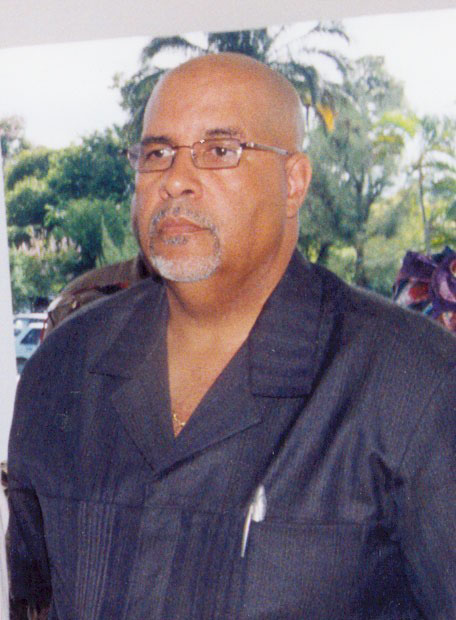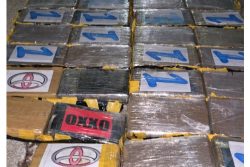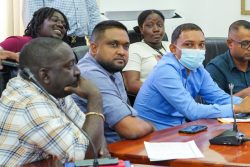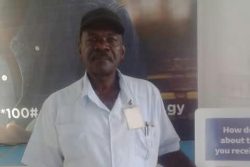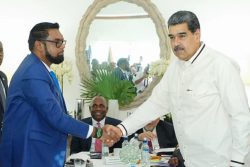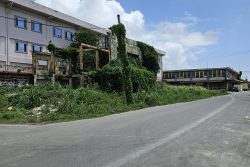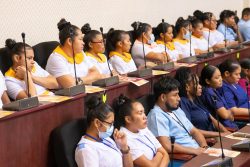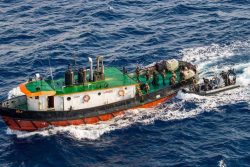Over $600 million is spent annually on procuring chemicals to treat the water supply, Managing Director of Guyana Water Inc (GWI) Richard Van West-Charles revealed on Monday and he said that the utility intends to significantly reduce this cost by using new filter technology.
Van-West Charles made the pronouncement at the GWI’s end-of-year press conference where he said that approximately $600M is spent on chemicals every year.
“Three sites that use a lot of chemicals (are) Georgetown, Bartica and Linden. The chemicals are needed because we are using a lot of surface water so it has to be properly treated and disinfected to remove the colour. It entails importing a lot of chemicals,” Van West-Charles said.
He explained that during 2018, they had in-depth discussions and visits to companies to look at “inline filters” that are being used around the world to substitute for the use of chemicals.
“We’ve had some research done with them and to date, the research shows we should be able to reduce the use of chemicals significantly in terms of the treatment process of water using different mediums and also using activated carbon. One of the good things is that we should be able to also produce the activated carbon because it is made basically from coconut shells and we have a lot of coconuts in Guyana,” he added.
Van West-Charles emphasised that they are looking at the process intensely and are currently at the final stage of their research. As a result, for 2019, they envisage procuring some of the inline filters for Georgetown and other areas.
Currently, GWI uses approximately 150 metric tonnes of the chemical per day, which translates to approximately eighty 50kg bags.
It was also explained that the difficulty in procuring the chemicals has significantly increased as they would often have to go further East and North to purchase and have it shipped to Guyana.
Meantime, Van West-Charles said that focus will be placed on a wastewater treatment plant this year and they, along with government, are currently looking to find ways to finance the project that will start in Georgetown.
GWI will also be installing more than 20,000 smart meters around the country as well as three new water treatment plants and storage tanks at Sophia and Eccles. Sections of the aged distribution network around Georgetown will also be replaced as the water company garners more revenue.
The current distribution network at South Amelia’s Ward will also be extended and works will be done to rehabilitate the Shelterbelt water treatment plant.
According to Van West-Charles, the Islamic Development Bank (IsDB) has made US$12 million available to them for water quality and metering initiatives to support the Water Supply and Sanitation Infrastructure Improvement Programme (WSSIIP) that is financed by the Inter-American Development Bank/European Union. The Caribbean Development Bank (CDB) has also made available a loan of US$19 million to conduct feasibility studies and for construction of new water treatment facilities.
The GWI executive also disclosed that the utility is currently in the final stage of negotiations with the Canadian firm CowaterSogema, to design and implement a business transformation project.
“We will be using a SCADA (Supervisory control and data acquisition) system (and) will be using technology more and more to give real time response. We can now tell when a pump stations is out and not functioning and that is as a result of the electronic loggers that are already installed. This is important because previously we depended on a mobile operator to call us to say the station is off. Right now, because of the loggers, the directors have access to the information on their phones and laptops when a pump station is off,” he said, while emphasising that the utility will be using more technology to enhance their processes and services.
GWI will also be procuring two rigs; one to dig wells in the hinterland areas and the other for the coastal area. He said that their staff are now equipped with the necessary competencies to use the rigs after they have been sent to various training programmes throughout the world during 2016 to 2018.
Over 34 personnel were trained in well drilling and maintenance, filtration and distribution systems, water quality analysis, wastewater treatment and management, geographic information system, integrated water resources management systems, quantity surveying, report writing and plumbing in Japan, Brazil, the United Kingdom, Holland, India, Israel and Suriname.
